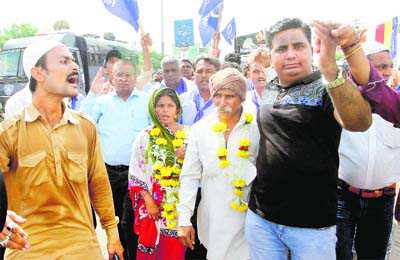
JOINING HANDS: Muslims welcoming people of the Dalit community during their “Bheem Rath Yatra” in Ahmedabad. PTI file photo
Rajmohan Gandhi
Thankfully for us, India’s independence struggle was firmly joined to a pledge of individual liberty. Passed in Karachi in 1931 – at the threshold of a crucial London conference on India’s political future – the Indian National Congress’s Resolution on Fundamental Rights asked a future free India to ensure every citizen’s liberty of thought, belief and expression.
Vallabhbhai Patel presided at that Karachi session. Subhas Bose played an active part in its deliberations. Gandhi and Nehru drafted the fundamental rights resolution. Though hanged a few days previously, young Bhagat Singh was a powerful presence.
The Karachi session was also impacted by Badshah Khan, whose nonviolent Khudai Khidmatgars had dramatically defied the Empire’s horses and guns in Peshawar only a year earlier, and by Delhi’s champion of Hindu-Muslim unity, Mukhtar Ahmad Ansari, whose participation in the London conference had been barred by the Empire.
Blessed by stalwarts, Karachi’s commitment of personal liberty was duly enshrined, 19 years later, in the Constitution of our republic. Although that pledge has been fulfilled for some citizens, a great many adult daughters and sons in independent India are not at liberty today to think, speak, eat or marry as they like. They face zabardasti or coercion from powerful neighbourhood groups, with whom relatives are frequently allied.
The Indian state too has been coercive at times, memorably during the Emergency forty-plus years ago. Some population segments and geographical regions have faced the state’s rough arm almost continuously. Yet non-state coercion may be India’s greater challenge.
Over several decades before and after Independence, leaders loved and respected by the masses spoke out against social or mob pressures. Individual freedoms were stoutly defended by personalities like Gandhi, Nehru, Patel, C.R., Sarojini Naidu, Azad, Ambedkar, Radhakrishnan, Zakir Hussain and J.P., if not always by the state.
When reformers were attacked in those times, or vulnerable groups threatened, India’s Hindus as also India’s Muslims heard unambiguous condemnation from persons they esteemed and in some cases adored. Liberty was bolstered and bullies were sidelined.
Today individual Indians have to fend for themselves. At times a gallant reporter may provide publicity and therefore some protection; at other times a courageous judge may come to the rescue; but very few leaders of national stature seem willing to guide the common Hindu or the common Muslim on the question of coercion.
Whether it is the brazen defence of triple talaq, or the hounding of Muslims and Dalits under the pretext of beef, we do not hear people in charge clearly condemning zabardasti. And we have hardly seen a sustained effort to catch the killers of Narayan Dabholkar, Govind Pansare and Malleshappa Kalburgi, three outstanding thinkers who were murdered for their opinions (separately but perhaps connectedly) between 2013 and 2015.
Personal liberty is not an issue that separates one Indian group from another. Individuals inside every Indian community seem to face coercion. Some positive changes may be acknowledged. In recent times, the RSS has condemned the exclusion and ill-treatment of Dalits.
But Muslims are conspicuously absent from RSS calls for tolerance and inclusion. When extreme Hindu groups target vulnerable Muslims, not only is the RSS silent, Prime Minister Narendra Modi and his senior Cabinet colleagues also refuse to speak out against the extremists.
The message sent to bullies is that they are free to coerce. To the police, the signal is, ‘Do not go after the bullies.’ To the targeted, the message is, ‘Best of luck,’ or, ‘Make peace with the bullies.’ Or, ‘Go to a safer place.’
Repeated day after day from a range of platforms, the unconstitutional notion that Muslims are not equal citizens finds no refutation either from the RSS or from the government.
Defenders of the government plead that Mr Modi cannot afford to alienate those who helped him gain his office. They should recognise that by firmly upholding what the republic’s founders bequeathed, namely equality and liberty for all, he would draw support from many among the two-thirds of all Indian voters who voted against the BJP in 2014.
We may not know just why Mr Modi hesitates to chastise the intimidators, but it is undeniable that his reluctance has damaged his and India’s image. The world abhors ISIS but it also dislikes anti-Muslim discrimination.
Few countries stand more firmly against Islamist terrorism than the US, but when the Republican nominee for president, Donald Trump, proposed a ban on the entry of Muslims, many in his party joined the nationwide outcry triggered against it.
The impression that persons in authority in India regard its Muslims as less than equal, and not entitled to personal liberty, is now a major obstacle on India’s path to global influence.
More importantly, that impression puts India’s security and stability at risk. No country, no matter its size, can afford to view close to 200 million of its people as less worthy than the rest.
But India’s Muslim leadership is also under the scanner. The heartlessness of ISIS and its like-minded associates requires the firm articulation of a vision for India’s Muslims that honours personal liberty and repudiates zabardasti, whether within or outside the Muslim community. This articulation cannot be left to a few courageous individuals in the film world.
When on January 1, 1948 (29 days before being killed), he was complimented by a Thai visitor on India’s independence, Gandhi remarked: ‘Today not everybody can move about freely in the Capital. Indian fears his brother Indian. Is this independence?’ (Pyarelal, Last Phase, 2: 697.) Almost 70 years later, citizens should be asking the question in all our towns and villages.
The writer is a historian and well known commentator.



























